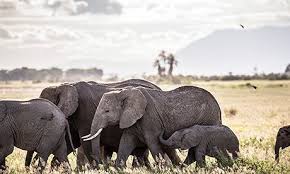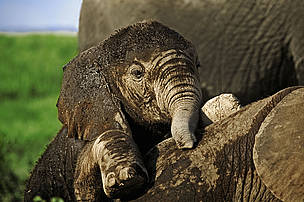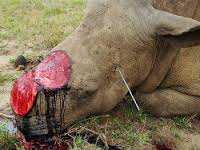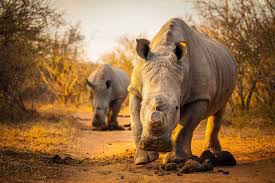| |
|
 |
What Laudato Si says about animals: a year on from the Green Papal Encyclical
June 30, 2016:
 |
 |
 |
Elephants in Amboseli National Park PHOTO: Zhang WeiyiXinhua Corbis |
“We are not God… and every act of cruelty towards any creature is “contrary to human dignity.”
A year ago this month, Pope Francis – named after the most famous lover of animals in Christian history – laid out the Catholic position on the environment – on our human relationship with Creation – in clear, beautiful, carefully considered language.
The Laudato Si (“Praise be”) Papal Encyclical implored “every person living on this planet” to transform our lives. Our current way of life has too high a cost - for the world’s poorest people, and the world’s animals – and as a result the earth “is beginning to look more and more like an immense pile of filth”.
He expressed a profound skepticism of large-scale agriculture, praising “small-scale food production systems which feed the greater part of the world’s peoples, using a modest amount of land and producing less waste.” (#129) and rejecting “the notion that our being created in God’s image and given dominion over the earth justifies absolute domination over other creatures.” See below for 10 powerful quotes about animals
 |
 |
 |
Elephants like this in Mozambique will likely be killed by poachers WWF reports . |
One of the great new insights of Laudato Si is what the Pope calls “integral ecology”– a recognition of the interconnection of all Creation, and, as Michel Roy of Caritas described it: “an invitation to heal the broken links between God, humankind and the planet… a call to arms to fight for global unity at the most profound level.”
The simple, bold vision of Laudato Si has proved helpful in the past year for both secular and faith based conservation groups. It has given them words and authority to lay out their critical message to combat poaching, to prevent animal cruelty, to promote less intensive agriculture and more sustainable living, and to urge living more simply and walking more lightly upon the earth.
It helped the Climate Change talks in Paris and led to more open UN climate negotiations. “I know that when the Pope speaks, we listen,” British member of Parliament Rebecca Pow said in the UK House of Commons. Read the Vatican Radio analysis on Laudato Si and Paris here.
“Let’s be honest: how many other Vatican documents exceeding 100 pages in length attract rolling coverage from news channels to live blogs, become an issue in an American presidential election, and even have animal welfare organisations proclaiming approval on the tail of a plane in the skies above Rome?”
CAFOD wrote, a year on.
“How many previous papal letters had pilgrims walking hundreds of miles across borders to demand action from heads of government who would then credit such a letter as acting as a catalyst for a UN climate accord? Yet this is what Laudato Si’ achieved in a mere twelve months”
Stopping poachingFr. Elias O. Opongo, SJ gave this analysis on the Catholic Ethics forum.
Pope Francis in his Encyclical Laudato Si warns against human greed that threatens the balance in ecosystem. He notes: "Caring for ecosystems demands far-sightedness, since no one looking for quick and easy profit is truly interested in their preservation. But the cost of the damage caused by such selfish lack of concern is much greater than the economic benefits to be obtained.
Where certain species are destroyed or seriously harmed, the values involved are incalculable" (no. 36). There have been numerable reports corroborating the connection between ivory trafficking, the world underground black markets which are worth hundreds of millions of dollars, and the corruption among Africa’s security forces, its ports, and customs offices as well as the insurgent groups and notorious criminal networks across the continent.
[1] There have been a number of reports that classify ivory as a major source of income for criminal syndicates and terrorist groups all over the world. Ivory trading is said to have surpassed diamonds, narcotics, small arms, or other commonly trafficked goods. These reports are verified by the record-breaking number of poached elephants and rhinoceroses, which undermines the ban on ivory poaching that was instituted in Africa in 1989, and continues to sustain the trends of exploitation and instability.
Link here for the full article.
10 reasons in Laudato Si to protect animals (compiled by Jesus People for Animals.
 |
 |
 |
Rhinos are being poached to extinction for their horns. PHOTO CATHOLIC ONLINE |
- “We are not God. … [N]owadays we must forcefully reject the notion that our being created in God’s image and given dominion over the earth justifies absolute domination over other creatures.”
- “Clearly, the Bible has no place for a tyrannical anthropocentrism unconcerned for other creatures.”
- “In our time, the Church does not simply state that other creatures are completely subordinated to the good of human beings, as if they have no worth in themselves and can be treated as we wish.”
- “[W]hen our hearts are authentically open to universal communion, this sense of fraternity excludes nothing and no one. It follows that our indifference or cruelty towards fellow creatures of this world sooner or later affects the treatment we mete out to other human beings. “Every act of cruelty towards any creature is ‘contrary to human dignity.'”
- “[T]he creatures of this world no longer appear to us under merely natural guise because the risen One is mysteriously holding them to himself and directing them towards fullness as their end.”
- “The very flowers of the field and the birds which his human eyes contemplated and admired are now imbued with his radiant presence.”
- “An inadequate presentation of Christian anthropology gave rise to a wrong understanding of the relationship between human beings and the world. Often, what was handed on was a Promethean vision of mastery over the world, which gave the impression that the protection of nature was something that only the faint-hearted cared about. Instead, our ‘dominion’ over the universe should be understood more properly in the sense of responsible stewardship.”
- “[St. Francis’] response to the world around him was so much more than intellectual appreciation or economic calculus, for to him each and every creature was a sister united to him by bonds of affection. That is why he felt called to care for all that exists.”
- “If we approach nature and the environment without this openness to awe and wonder, if we no longer speak the language of fraternity and beauty in our relationship with the world, our attitude will be that of masters, consumers, ruthless exploiters, unable to set limits on their immediate needs. By contrast, if we feel intimately united with all that exists, then sobriety and care will well up spontaneously.”
- “We read in the Gospel that Jesus says of the birds of the air that ‘not one of them is forgotten before God’ ( Lk 12:6). How then can we possibly mistreat them or cause them harm?”
 |
 |
 |
A project in Australia is introducing rhino from Africa, in the hope of protecting them. PHOTO: Shannon Wild ABC |
RESOURCESLaudate Si and Poaching of Elephants and Rhinos in Africa.
One year on: UK Laudato Si week celebrations open at a green Catholic school in London: report from Columbans.
Laudato Si and Interconnection: Caritas message .
Humane Society calls the encyclical “truly historic” for its call for all of us to embrace a more humane path..
The impact of Laudato Si one year on, including the focus on interconnectedness: CAFOD blog.
CAFOD Laudato Si study guide and DVDs
Vatican Radio: Laudato Si’s impact on the UN climate talks.
Elephants n Mozambique will likely be killed by poachers, WWF reports .
How Catholic parishes and schools around the world have integrated green practices as a response to the Papal Encyclical: Catholic News.
|
 |
 |
|
|
|
|
|
 |
Wildlife and Forests
Every faith teaches us about our relationship with the natural, wild world. This is why wildlife programmes are a particularly important area for ARC. |
 |
June 30, 2016:
What Laudato Si says about animals: a year from the Green Papal Encyclical
A year ago this month, Pope Francis – named after the most famous lover of animals in Christian history – laid out the Catholic position on the environment – on our human relationship with Creation – in clear, beautiful, carefully considered language. Here we explore what he said about protecting animals. |
 |
June 18, 2015:
Far reaching Papal Encyclical on the Environment published today
Today something very extraordinary happened in the journey to link religions with conservation and conservation with religions. The Pope issued an encyclical urging Catholics to make real changes in their priorities to avert the “unprecedented destruction of the ecosystem”. |
 |
 |
|
|

